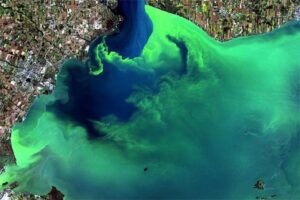By VOICES Staff.
As America charts a course toward building, crewing and sailing more U.S. ships, maritime innovators are stepping up to meet the need to protect our inland waterways, Great Lakes and ocean territory. Among them is Florida-based Seascour, a company revolutionizing one of the most overlooked, and potentially environmentally harmful, aspects of ship maintenance: chemical descaling.
One issue with traditional descalers is their potential contributions to serious algal blooms. These blooms are a massive problem across the US and the world. They deplete oxygen levels, disrupt marine ecosystems, threaten aquatic life and have led to entire harbors being closed.
Seascour aims to disrupt this market with plant-based alternatives to acid-based cleaning chemicals. This organic solution aims to reduce the environmental footprint of port operations and is helping shipowners comply with stricter federal, state and industry standards.

“The era of caustic chemical cleaning must end,” says Seascour President Kelly Hendry, whose company operates out of Tampa’s Gulf Marine Shipyard. “At Seascour, we’re proving that environmental protection and operational efficiency don’t have to be in conflict—they can work together.”
That message aligns powerfully with the American Maritime Partnership’s Sailing to a Green Future report, which outlines how Jones Act operators are already among the most fuel-efficient and environmentally conscious freight movers in the world. Waterborne transportation produces less than one-tenth the emissions of trucks and far less than rail, per ton-mile of cargo moved.
As domestic carriers modernize their fleets and adopt more energy-efficient systems, fleet managers and carriers working to repower their vessels have a critical need to conduct routine maintenance faster, safer and cleaner.
“A two-day drydocking requiring heat exchangers to be removed and reinstalled can be replaced by a three-hour flush with Seascour at sea,” Hendry said. “Just figure the cost saving there. Immediately, sailing days are freed up, drydocking costs are removed, and importantly, the equipment is not being damaged. Using toxic chemicals to clean the heat exchanger or HVAC system can damage the equipment and the machinery and pipes around it. Seascour can revolutionize descaling, traditionally one of the toughest, most polluting jobs in a shipyard, making it fast, safe and easy.”
Made in America inventions like Seascour are already being tested by the U.S. Navy, U.S. Coast Guard and NOAA. Jones Act carriers, including Central Marine Logistics and Savage, have also started using organic descalers in their fleets.
This innovation matters at a critical time. According to AMP’s report, the domestic maritime industry is:
- Investing billions in greener vessels and propulsion systems,
- Deploying modern tugboats that reduce emissions by up to 80%, and
- Supporting job creation in environmentally responsible shipyards
Seascour is the latest example of how the U.S. maritime industry is not just adapting to regulatory pressures and the need to protect our environment, it’s leading through innovation.
Come Aboard
"*" indicates required fields
